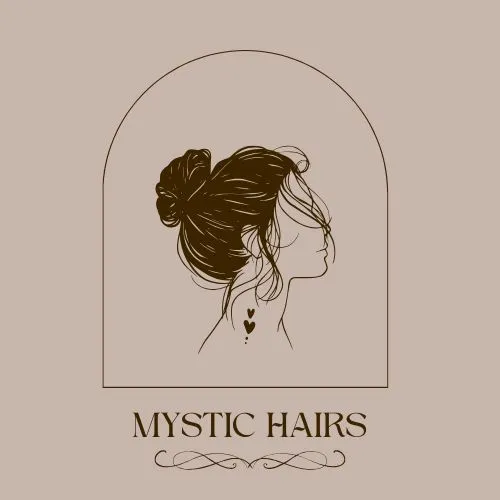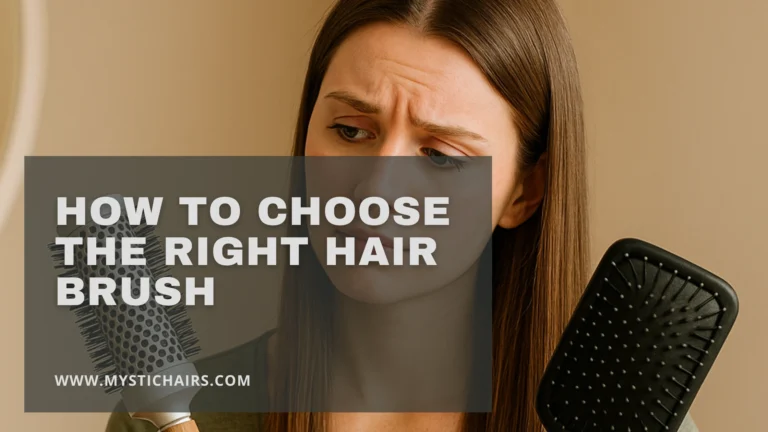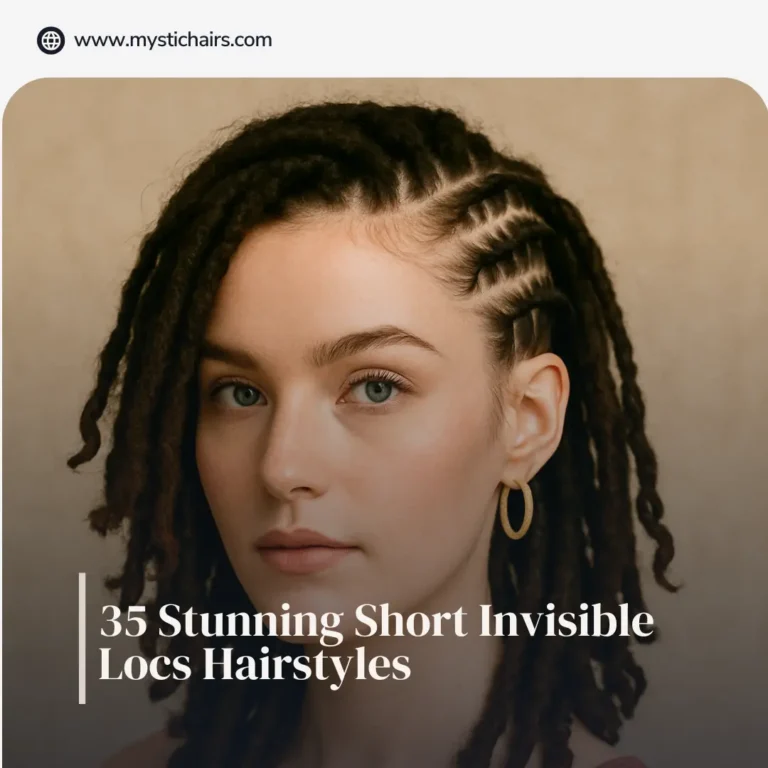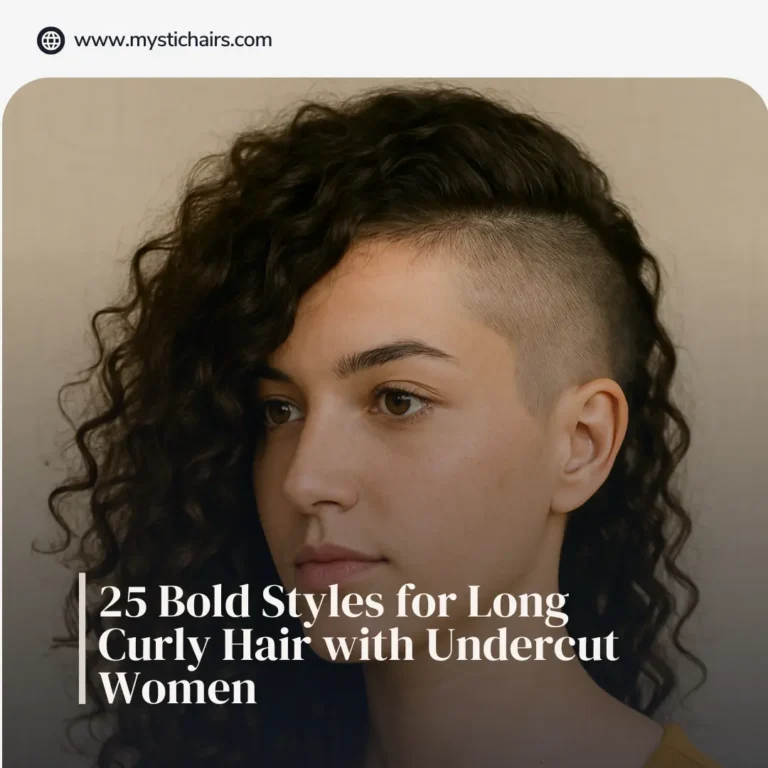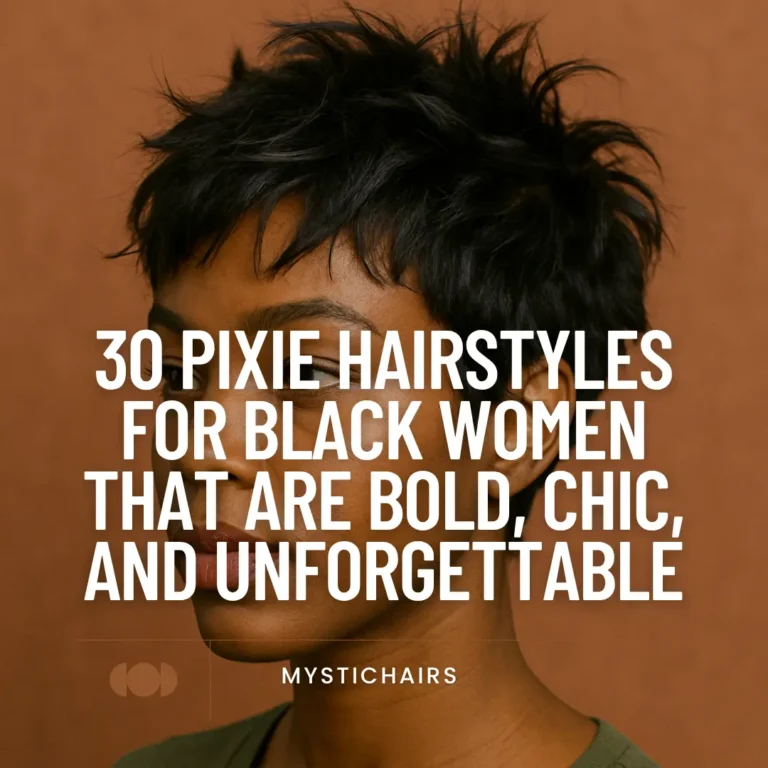Why Does My Hair Dry Frizzy? Causes, Fixes, and Expert Tips for Smooth Strands
Why does my hair dry frizzy? This is a question many people ask when they notice their strands puffing up instead of falling sleek and smooth. Frizz happens when your hair lacks moisture, causing the cuticle layer to lift and let humidity sneak in. The result? Unruly strands that refuse to settle, no matter how much styling you do. Understanding the root cause of frizz is the first step to restoring softness and control to your hair.
But frizz isn’t just about dryness — factors like hair type, porosity, product buildup, and even your washing routine can play a big role. If your hair often feels rough, brittle, or frizzy after air-drying or blow-drying, you’re not alone. The good news is that with the right products, treatments, and preventive care, you can smooth your strands and enjoy healthier, more manageable hair. In this guide, we’ll break down the top reasons for frizz and how to fix them naturally and effectively.
Why Does My Hair Dry Frizzy?
1. Lack of Moisture in the Hair
One of the main answers to “why does my hair dry frizzy” is simple — your hair lacks moisture. When strands are dry, the cuticle layer lifts, making it easier for humidity to seep in and cause puffiness. Dry hair is more prone to frizz because it tries to absorb water from the air, creating a rough texture and uneven surface. If you often skip conditioner or use harsh shampoos, this can worsen the dryness and make frizz more noticeable.
To fix this, focus on hydration. Choose sulfate-free shampoos and deep conditioning treatments at least once a week. Hydrating masks with ingredients like shea butter, argan oil, or coconut oil can restore elasticity and reduce frizz significantly. Staying consistent with moisturizing products is one of the best frizzy hair remedies to keep your hair smooth and soft.
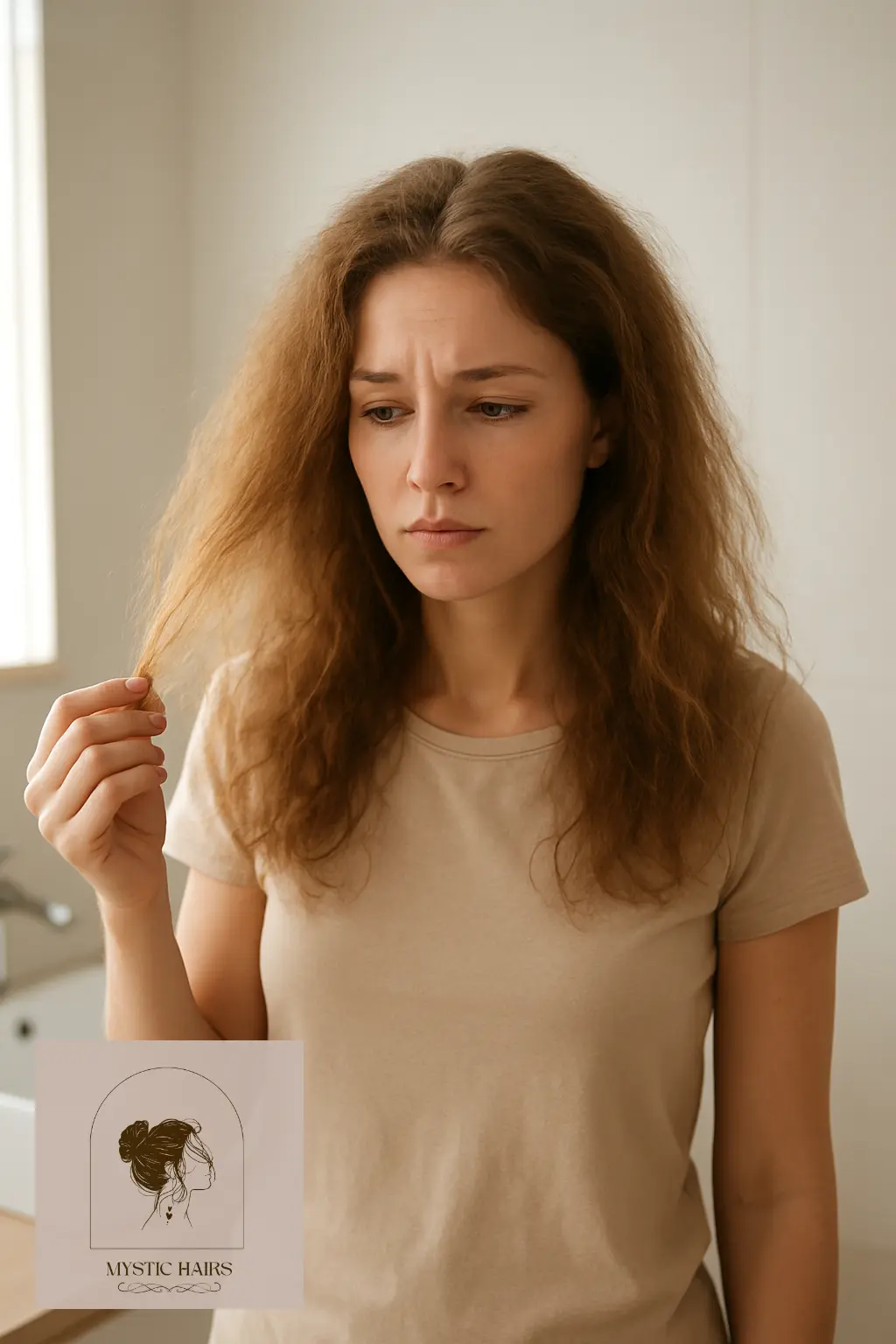
2. High Hair Porosity
Hair porosity plays a huge role in frizz. If you’ve ever asked, “why does my hair dry frizzy even after conditioning?” the answer might be high porosity. This means your cuticles have gaps or cracks that let in moisture but can’t hold it, leaving strands rough and prone to frizz. Heat styling, chemical treatments, and color damage often increase porosity.
To manage high-porosity hair, use leave-in conditioners and sealing oils that lock in hydration. Lightweight serums containing jojoba oil or almond oil can smooth the cuticle, while protein treatments help repair gaps. Managing porosity is key if you want long-term control over dry frizzy hair.
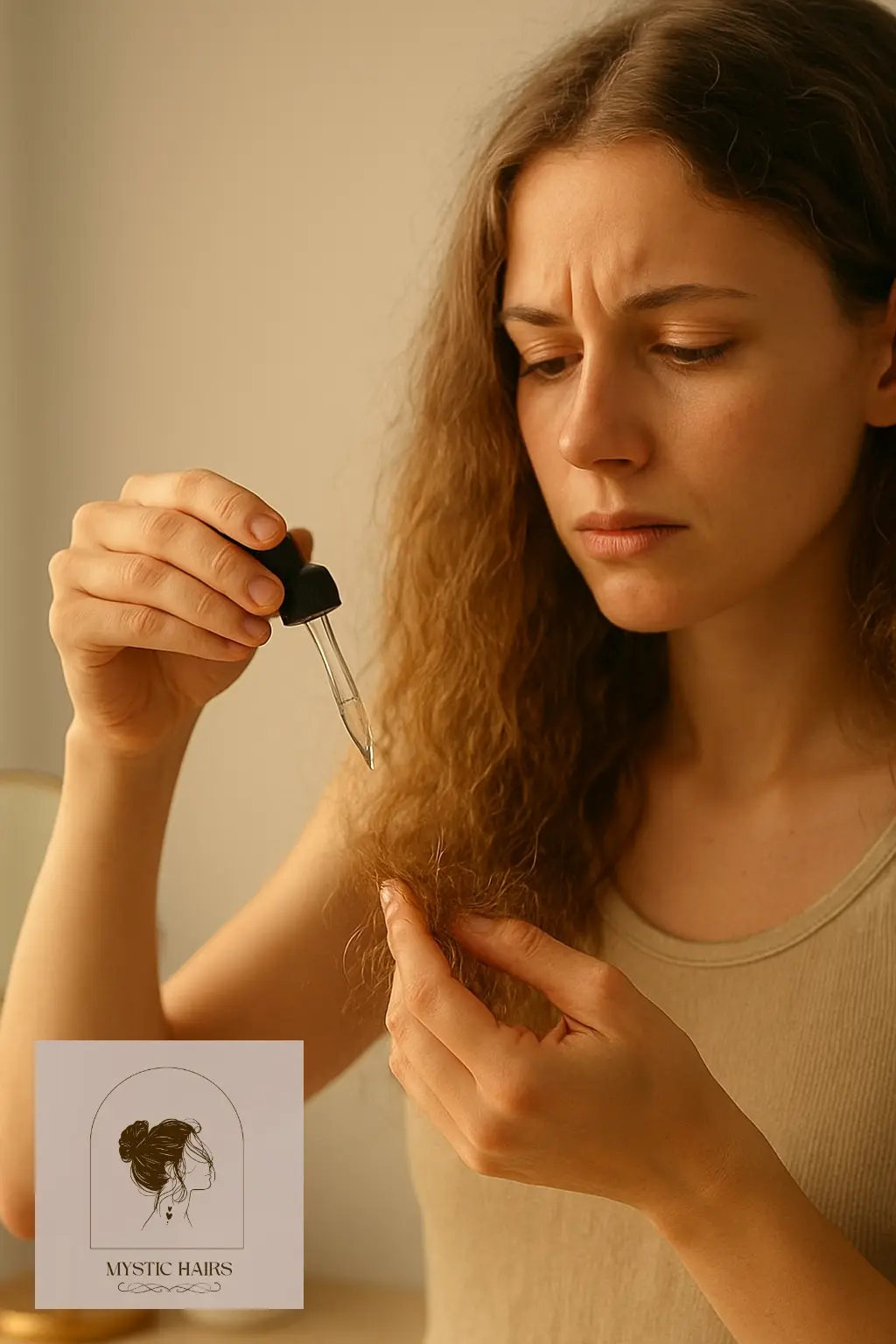
Frizz often comes from excess heat exposure during styling. Learning how to blow dry hair without heat damage helps you achieve smooth, polished results while protecting your strands from dryness.
3. Humidity and Weather Conditions
Another major reason behind the question, “why does my hair dry frizzy?” is the climate. Humidity is the biggest culprit because frizzy hair thrives when moisture in the air enters dry strands. Even naturally straight hair can frizz up in humid weather if it lacks proper protection.
To prevent humidity-related frizz, use anti-frizz sprays and serums that act as a barrier against excess moisture. Products with silicone or humidity-resistant polymers help create a protective shield, keeping your hair sleek. Carrying a small travel-size anti-frizz product can be a lifesaver during rainy or humid seasons.
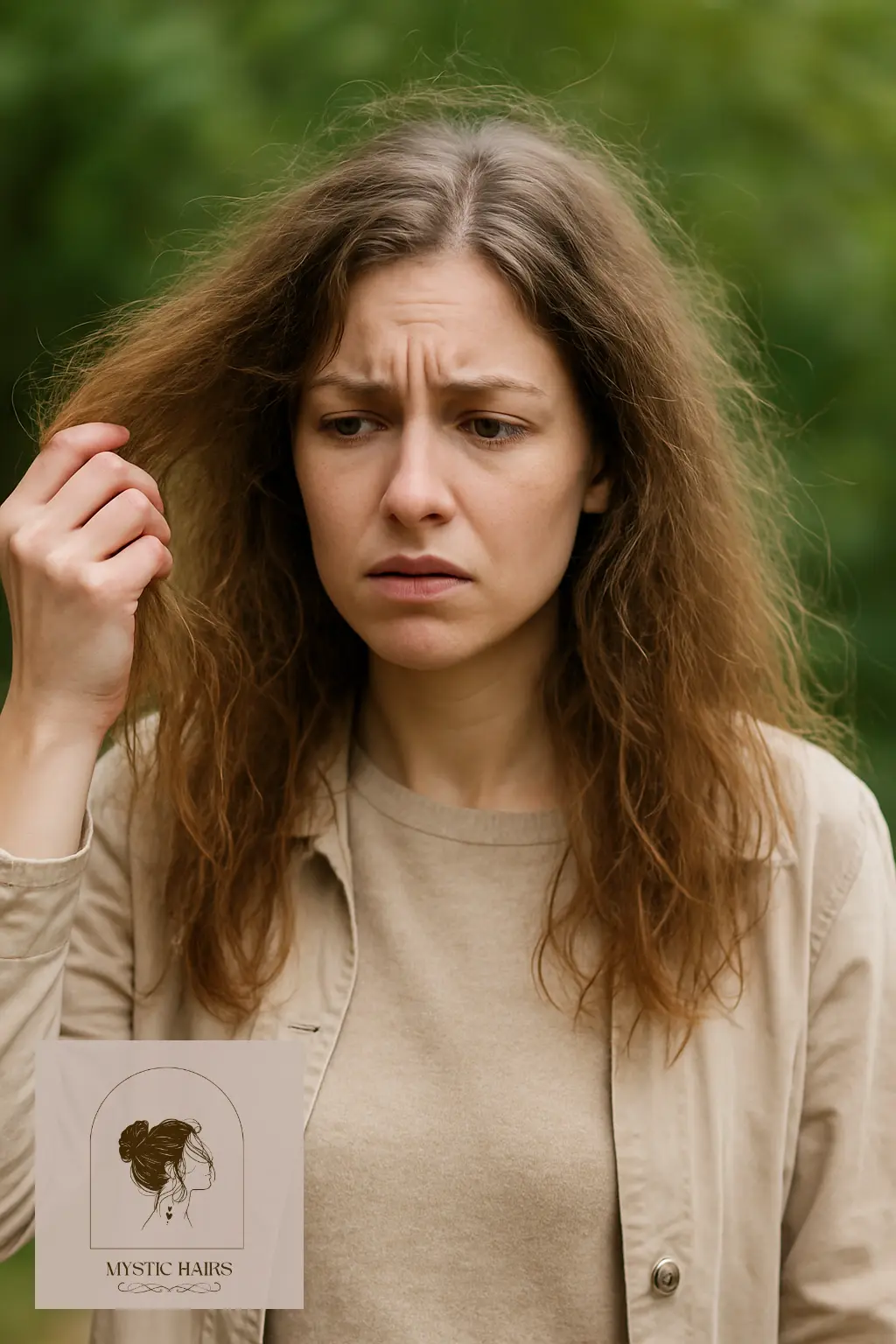
4. Over-Washing and Harsh Shampoos
If your hair feels rough and frizzy after every wash, you might be over-cleansing. Constant washing strips away natural oils, leaving your hair dehydrated and dull. This is one of the most overlooked causes of dry frizzy hair.
Try washing your hair only two to three times per week with gentle, sulfate-free shampoos. On non-wash days, use a lightweight dry shampoo or co-wash with conditioner to refresh your strands. Maintaining a balanced wash routine ensures your natural oils keep your hair shiny and frizz-free.
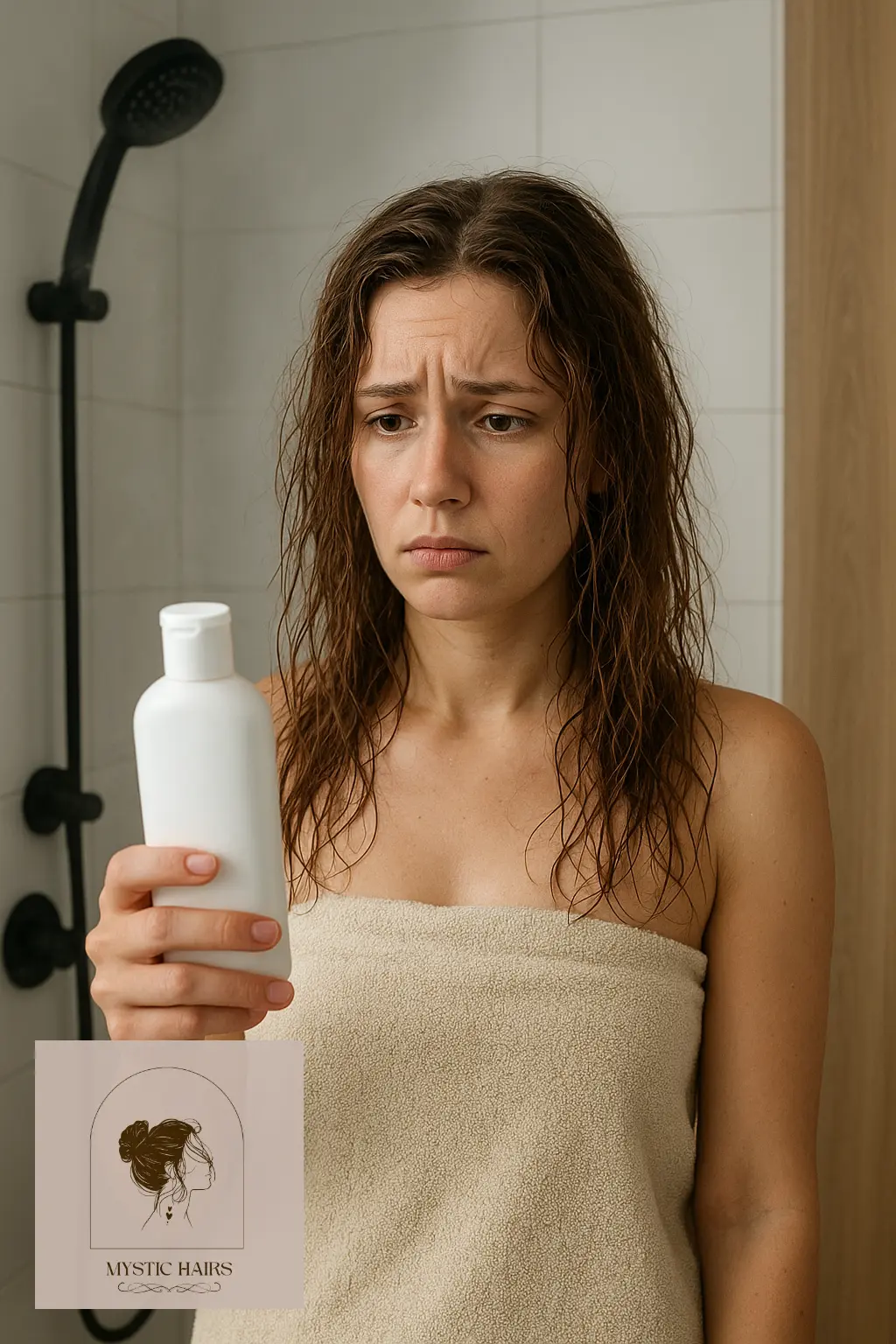
Frizz can sometimes make uneven color look more noticeable. Exploring how to fix uneven hair color ensures your shade looks balanced and glossy, even if your texture is prone to puffiness.
5. Heat Damage from Styling Tools
If you’ve been wondering, “why does my hair dry frizzy after straightening or blow-drying?” the culprit could be heat styling. Excessive use of flat irons, curling wands, and blow dryers weakens the cuticle, making your strands rough and more likely to frizz.
Always apply a heat protectant before styling, and keep your tools at medium heat instead of max temperature. Air-drying partially before using heat can reduce damage. Incorporating a weekly nourishing oil treatment is also an excellent way to restore softness to heat-damaged frizzy hair.
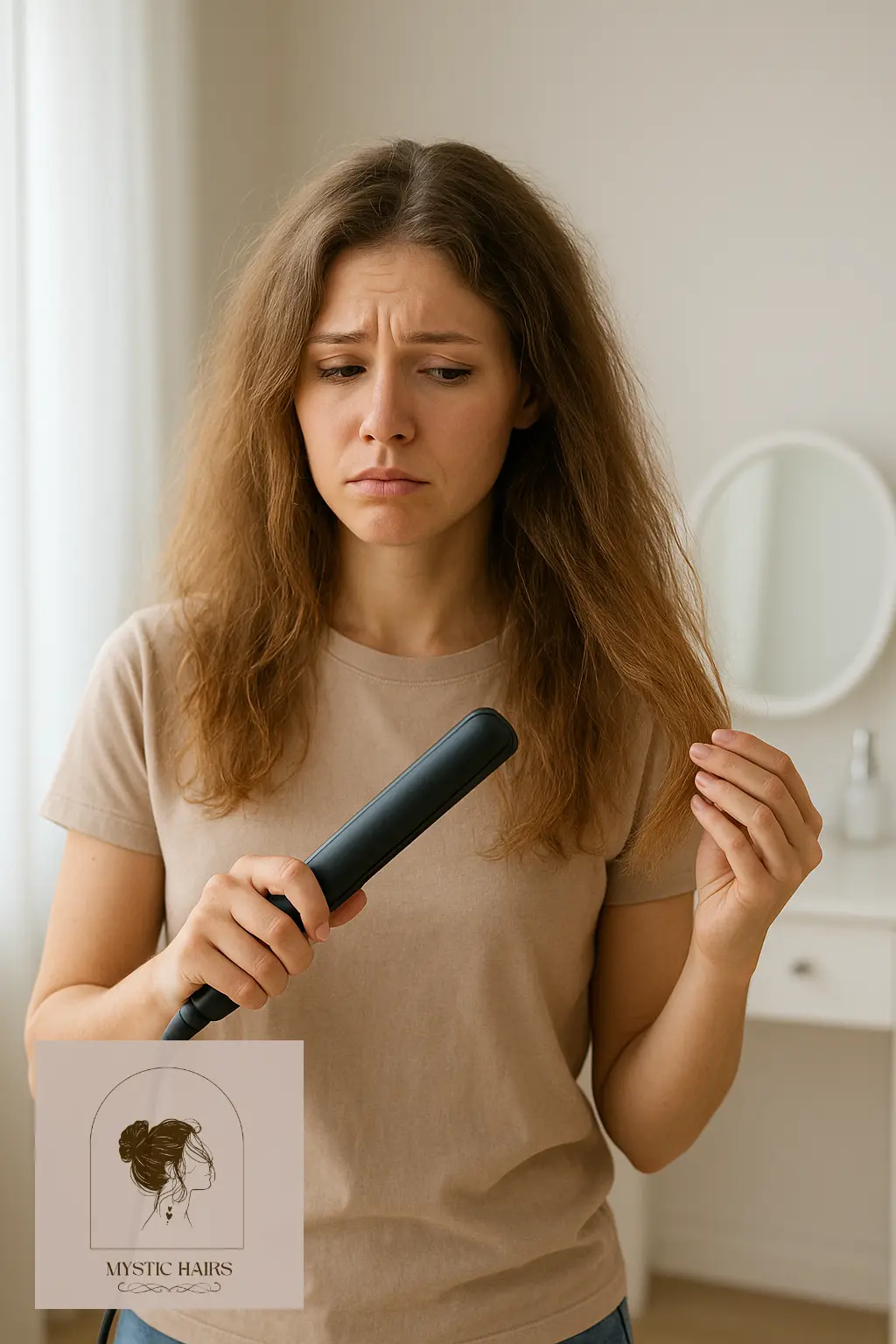
6. Product Buildup and Wrong Products
Using too many heavy products can also answer the question, “why does my hair dry frizzy?” Styling creams, hairsprays, and gels can build up on the hair shaft, weighing it down while leaving the ends dry and brittle.
Clarifying shampoos once a month can reset your scalp and remove buildup. Follow up with a hydrating conditioner to keep your hair balanced. Choosing products that match your hair type — lightweight for fine hair and richer creams for coarse hair — helps reduce frizz naturally.
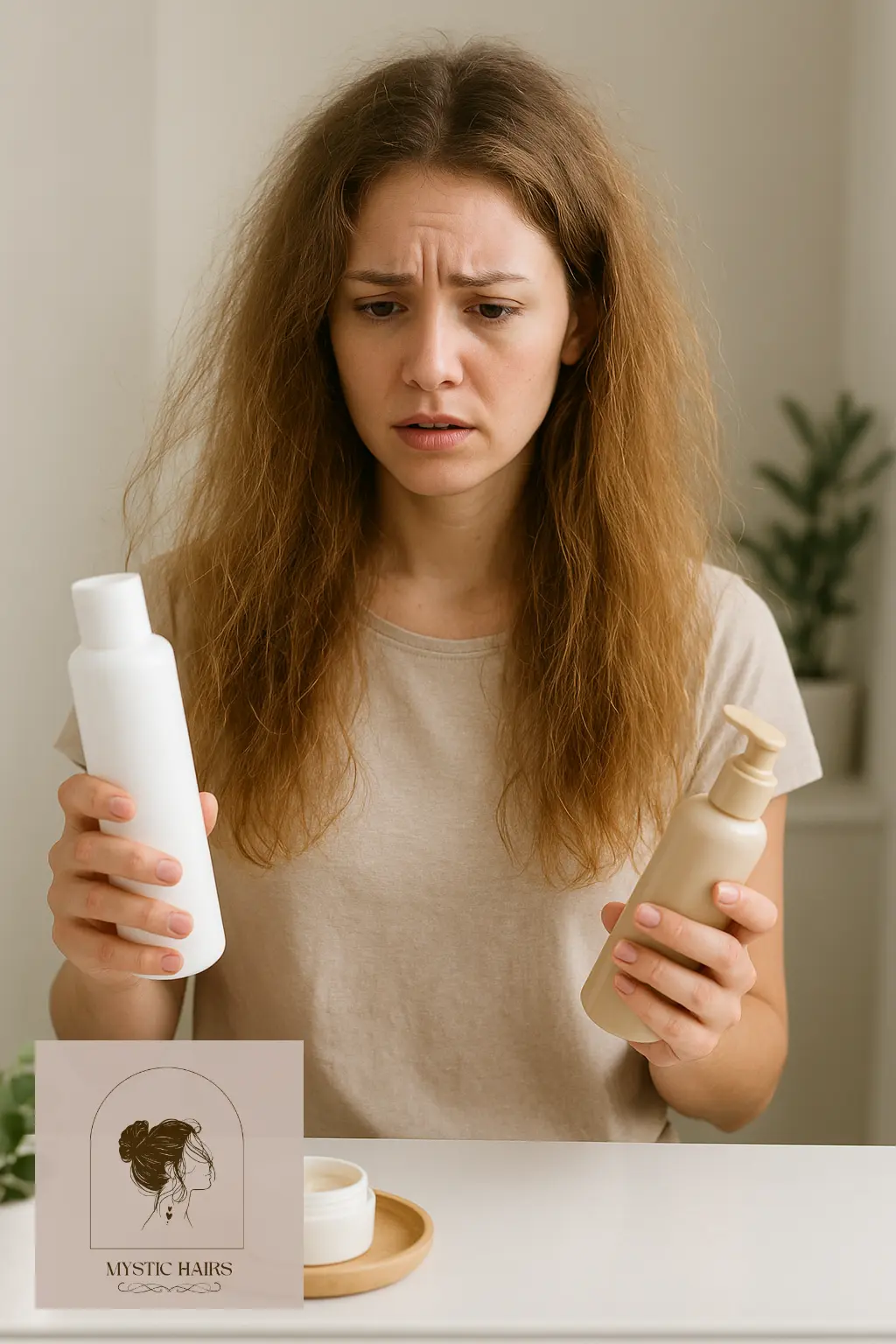
Frizz disrupts definition and makes curls fall flat quickly. Understanding how to make your hair hold a curl gives you techniques to control frizz while keeping your style bouncy and long-lasting.
Solutions for Dry, Frizzy Hair
- Use hydrating hair masks weekly.
- Switch to sulfate-free shampoos and conditioners.
- Apply a leave-in conditioner or serum for daily frizz control.
- Protect hair with heat protectant sprays before styling.
- Sleep on a silk or satin pillowcase to reduce friction.
- Try natural oils like argan, jojoba, or coconut oil for sealing moisture.
FAQs About Why Hair Dries Frizzy
1. Why does my hair dry frizzy even after conditioning?
Hair can still dry frizzy after conditioning if your hair cuticles are raised due to damage, dryness, or exposure to humidity. Even with conditioner, if you’re not sealing in moisture with a leave-in treatment or serum, your hair may appear frizzy once dry. Using sulfate-free shampoo and deep conditioning weekly can help reduce frizz.
2. Can hard water make my hair dry and frizzy?
Yes, hard water can cause mineral buildup on the scalp and hair strands, making it difficult for moisture to penetrate. This often leads to dryness, dullness, and frizz. Installing a shower filter and using a clarifying shampoo can help remove buildup and reduce frizz.
3. Why does curly hair dry frizzier than straight hair?
Curly hair is naturally more porous, meaning it loses moisture faster than straight hair. This lack of hydration causes curls to puff up and frizz as they dry. Applying a curl cream, leave-in conditioner, or anti-frizz serum while your hair is damp can help lock in moisture and keep curls defined.
4. How do I stop my hair from drying frizzy naturally?
To prevent frizz naturally, avoid towel-drying with rough fabrics—use a microfiber towel or cotton t-shirt instead. Apply natural oils like argan oil, coconut oil, or jojoba oil to seal in moisture. Rinsing hair with cool water at the end of your shower can also help smooth the cuticle and reduce frizz.
5. Does humidity make hair dry frizzy?
Yes, humidity is one of the biggest causes of frizz. When the air is moist, dry hair absorbs excess water molecules, causing strands to swell and frizz. Using anti-humidity sprays, lightweight gels, or styling creams can create a protective barrier against moisture in the air.
6. What products help with frizzy, dry hair?
The best products for frizzy hair include sulfate-free shampoos, hydrating conditioners, leave-in treatments, hair masks, and anti-frizz serums. Ingredients like shea butter, argan oil, keratin, and glycerin help smooth and nourish frizz-prone hair.
7. Why does my hair get frizzy when I blow-dry it?
Blow-drying at high heat without protection can strip hair of moisture and roughen the cuticle, leading to frizz. Always apply a heat protectant spray and use a diffuser or nozzle attachment. Drying on a lower heat setting helps maintain smoothness.
Conclusion
If you’re constantly asking, “why does my hair dry frizzy?” the answer lies in a mix of moisture balance, hair porosity, and daily habits. Frizz is your hair’s way of asking for hydration and protection. With the right care routine, including moisture-rich products, anti-frizz treatments, and gentler styling methods, you can transform frizzy strands into smooth, shiny, and healthy hair.

Aria Blake is a beauty writer and hairstyle curator passionate about empowering women through timeless trends and modern haircare. With a deep love for natural textures and creative styling, Aria blends expert tips with real-life inspiration to help you look and feel your best—every single day. When she’s not writing for MysticHairs.com, you’ll find her exploring protective styles, sipping herbal tea, or pinning dreamy looks for your next hair glow-up.
